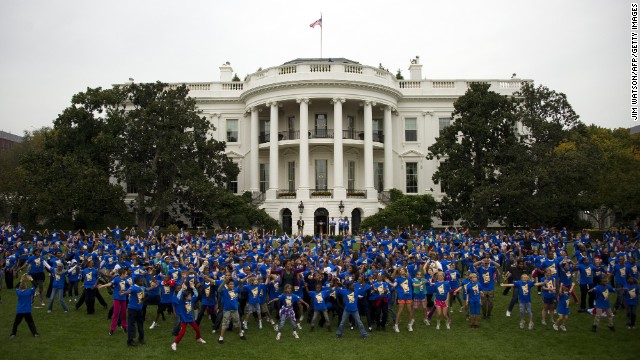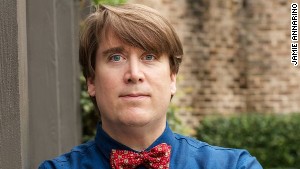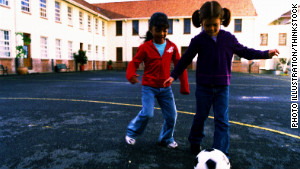
Editor's note: John
Bare is vice president of the Arthur M. Blank Family Foundation and
executive-in-residence at Georgia Tech's Institute for Leadership and
Entrepreneurship.
(CNN) -- C'mon, kids. Don't just sit there. Play. It's the first day of the New Year, so there's no better time to start.
With all the sporting
events on TV this time of year, parents need to be sure kids take a
break from watching others play games and do some playing themselves.
Play will improve a kid's life. Jill Vialet guarantees it.
Vialet, who is emerging as America's Play Laureate with her new young-adult novel "Recess Rules" has given the world a free guide to games, from "All Tangled Up" to "Zip, Zap, Pop."

John Bare
Best of all, no power cord is required.
When I met Vialet five
years ago, she was ramping up her nonprofit organization, Playworks, to
go national. She taught me that instead of treating play as the opposite
of work, play carries its own intrinsic value.
Play is not an indulgent
diversion from what's really important. It enhances what's most
important in our lives -- relationships, school performance and even
brain development.
Schools across the
country are catching on. Thanks to Vialet's genius, nearly a
half-million students in 23 cities are discovering the magic of playing
during recess. (The foundation where I work is funding Playworks
training in Georgia.)
For these schools, play is the new work.
In a nation where we're
supposed to keep our shoulder to the wheel, keeping a hula hoop around
our hips turns out to be just as important.
 School bans balls during recess
School bans balls during recess
With all the high-tech
innovations and education-reform models competing for favor, the oldest
of old-school notions, plain old recess, produces remarkable benefits.
Vialet's road to recess
began in 1995, when a principal unloaded with tales of recess
nightmares. Fights on the playground. Teachers not ready or not willing
to supervise recess. Disengaged kids just waiting around on the
playground. Antsy kids unable to sit still in the classroom.
So Vialet founded
Playworks, to which schools could outsource recess. Vialet was taking a
problem off the principal's hands, and she believed she could run recess
cheaper and more effectively than schools could.
Once she got the program
going, Robert Wood Johnson Foundation put serious money into expansion.
The foundation also put up money for Stanford University and
Mathematica Policy Research to carry out a high-stakes test. Evaluators
randomly assigned some schools to try the Playworks approach. Then they
compared student results at the Playworks schools to those from students
at similar set of schools not using the program.
The findings require us
to re-imagine recess. Instead of questioning whether schools can afford
recess, Playworks began asking how schools could afford not to offer
recess.
At schools using
Playworks, there were fewer cases of bullying. Students felt safer at
Playworks schools. While Playworks was not created as an anti-bullying
program, it has emerged as a promising tool to create safe settings for
student learning.
Kids in Playworks
schools also spend more time in vigorous physical activity, and schools
did not have to juggle their class schedule to add more P.E. In the
national push to get kids moving, recess, not P.E., is looking like the
answer.
All of this leads to my favorite lesson from Vialet:
"Do you know how hard it
is to get kids to exercise for 60 minutes a day?" she told The New York
Times. "Do you know how easy it is to get kids to play for 60 minutes a
day?"
We don't have to run
kids through a Marine boot camp to improve their physical fitness. All
we need to is allow them to play. It's one reason the Detroit Lions football club is
teaming up with Playworks. Through its Play 60 initiative, the National
Football League is helping kids find ways to be active for 60 minutes
every day. Kids can play their way to Play 60.
Further, Playworks
students were in their seats, attentive and focused. Having burned off
the extra energy during recess, the students were fidgeting less. This
smoother transition to the classroom translates into more time for real
instruction. Thanks to the "re-captured" time, Playworks students
received an additional 20 hours of instruction during the school year.
For teachers, Playworks
is the gift that keeps on giving. With Playworks staff running recess,
teachers are freed up to focus on teaching. Then students show up in
class ready to learn.
Play shapes how the
brain is wired. In his book, "Play: How It Shapes the Brain, Opens the
Imagination and Invigorates the Soul", Dr. Stuart Brown describes both
the social and biological benefits of play. More play is associated with
the kind of brain development that helps us grasp and make sense of
information.
Dr. John Ratey's work goes further,
describing how regular physical activity helps aging adults keep their
wits. It's smart business for parents to join their kids in play.
So skip the resolutions this year. Just play.
No comments:
Post a Comment